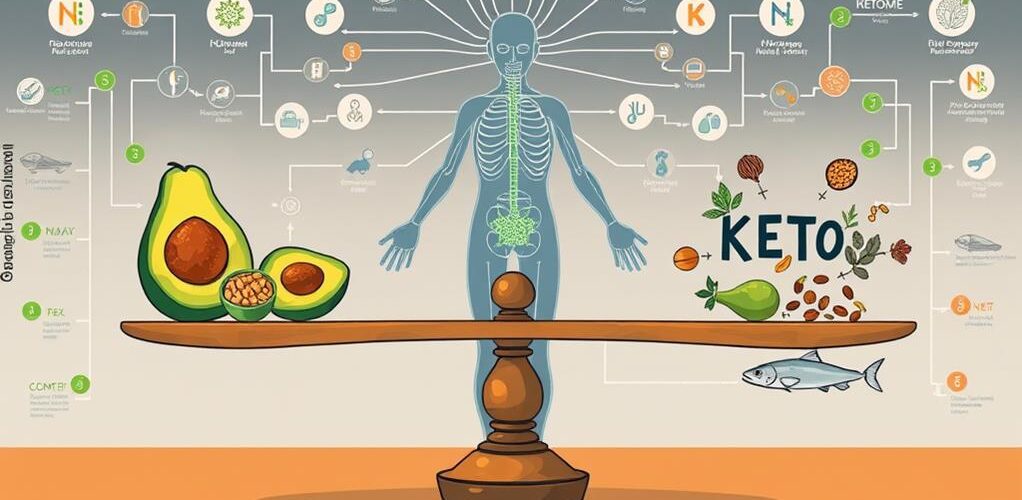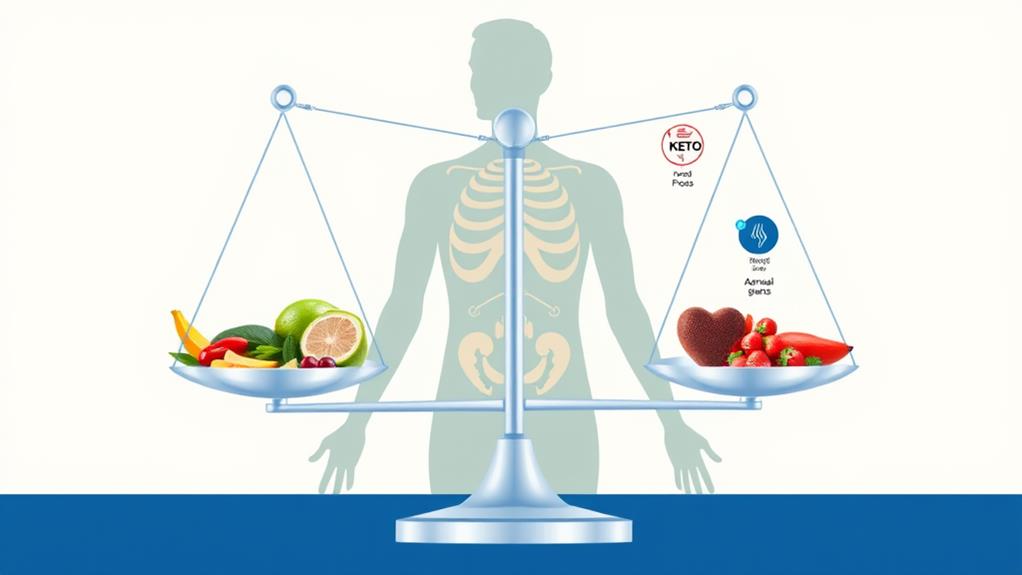
The keto diet is known for weight loss, but did you know it can mess with your hormones too? When you're on keto, your body burns fat as fuel, which sounds cool, right? But, it can cause some hormonal issues, especially for girls. You might get irregular periods or even miss them! Plus, low carbs can increase stress hormones, making you feel all jittery. The diet can also lead to missing out on important vitamins and minerals, affecting your mood and health. So, while keto has its perks, it's super important to know these potential side effects—there's much more to uncover about how it really works!
Key Takeaways
- The ketogenic diet may lead to hormonal imbalances, affecting estrogen and progesterone levels, causing irregular menstrual cycles or amenorrhea.
- Nutritional deficiencies in magnesium, potassium, calcium, and B vitamins from the keto diet can impact mood and hormonal balance.
- Low carbohydrate intake on the keto diet can elevate cortisol levels, worsening stress and weight retention.
- The keto diet is risky for individuals with liver failure or chronic kidney disease due to potential strain on these organs.
- Regular lab tests for metabolic panels, hormone levels, and micronutrient status are essential to monitor health while on the keto diet.
Scientific Evidence of Keto
The ketogenic diet's (KD) efficacy is supported by substantial scientific evidence, demonstrating its potential for significant weight loss and metabolic improvements.
Imagine shedding pounds while munching on bacon—sounds dreamy, right? Studies show KD can lead to 2-3 times more weight loss compared to low-fat diets. Why? It curbs your appetite and revs up fat burning, making you a fat-burning machine!
One of the coolest things about KD is keto adaptation. When you cut carbs, your body flips a switch and starts using fat for fuel, producing magical little molecules called ketone bodies. These ketones power your brain even when carbs are scarce, like a backup generator kicking in during a power outage.
But wait, there's more! KD isn't just a weight-loss wonder. It can also help people with conditions like type 2 diabetes and metabolic syndrome.
Hormonal Changes in Women
While the ketogenic diet has shown remarkable benefits for weight loss and metabolic health, it is essential to evaluate its effects on hormonal balance, especially in women. Women following a keto diet might experience hormonal imbalances, including fluctuations in estrogen and progesterone levels. These changes can lead to irregular menstrual cycles or even amenorrhea, which is the absence of periods.
Reducing carbohydrates drastically on the keto diet can increase cortisol levels, a stress hormone. High cortisol can make stress-related weight retention and metabolic issues worse.
Without enough fiber, which is often low in keto diets, serotonin and insulin metabolism can get out of whack. This imbalance can affect mood and reproductive hormones negatively.
Research shows that high-fat diets might boost estrogen production. While this might sound good, too much estrogen can mess with thyroid function, making weight management harder.
Women with conditions like PCOS and endometriosis might find their symptoms worsen due to these hormonal disruptions.
In essence, while keto can be beneficial, women need to be aware of its dietary impact on hormonal balance. Monitoring and adjusting the diet as needed can help mitigate these potential issues.
Impact on Menstrual Health
The ketogenic diet, known for its low-carb approach, can sometimes cause menstrual irregularities or even halt periods altogether, especially in women with low body fat or caloric intake.
This can lead to functional hypothalamic amenorrhea, where stress and low calorie intake mess with hormone signals, disrupting the menstrual cycle.
Additionally, very low-carb diets may worsen PCOS symptoms, complicating menstrual health due to hormonal imbalances.
Irregular Menstrual Cycles
Adopting a ketogenic diet, characterized by its low carbohydrate intake, can have significant repercussions on menstrual health, often leading to irregular cycles or even amenorrhea, the absence of menstruation for three months or more. When women make such drastic dietary adjustments, their bodies can experience a series of hormonal shifts. This is primarily because the low calorie intake associated with keto can decrease leptin levels, a hormone essential for regulating reproductive health.
| Impact | Description |
|---|---|
| Irregular Cycles | Menstrual cycles can become unpredictable due to hormonal imbalances. |
| Amenorrhea | Some women might stop menstruating for three months or more. |
| Hormonal Disruption | Low carb intake can mess with reproductive hormones. |
| PCOS Exacerbation | Keto may worsen symptoms of polycystic ovary syndrome. |
Some studies suggest that these hormonal fluctuations can make conditions like polycystic ovary syndrome (PCOS) worse, potentially worsening symptoms. Limited research indicates that women on low carb diets may experience changes in menstrual cycle regularity, though further longitudinal studies are necessary to confirm long-term effects. As a result, it is essential for women to monitor their menstrual health when following a ketogenic diet. If significant changes occur, it might be wise to reevaluate dietary choices to guarantee hormonal balance.
Hypothalamic Amenorrhea Risks
Disruptive dietary practices, such as the ketogenic diet, can precipitate hypothalamic amenorrhea, a condition characterized by the absence of menstruation for three months or more. This can be a pretty big deal, especially for women who are trying to balance their health and hormones.
One of the main amenorrhea causes is low calorie and carbohydrate intake, both of which are common in the keto diet. When your body doesn't get enough carbs or calories, it disrupts the signals your reproductive hormones need to function properly.
Low leptin levels, which happen when your body fat decreases and you consume fewer carbs, can really mess with the hypothalamus. This part of your brain is like the control center for your menstrual cycle, and when it's out of whack, periods can stop altogether.
Stress, high cortisol levels, and low energy availability on a keto diet can make this even worse. Significant weight loss from very low carb diets can also lead to irregular menstrual cycles or even amenorrhea.
If you notice these symptoms, it might be time for some dietary adjustments. Consulting a healthcare professional can help you restore balance and get back on track.
Potential Nutritional Deficiencies
Engaging in a ketogenic diet can inadvertently result in various nutritional deficiencies that have significant implications for hormonal health. When you limit your carb intake, you might miss out on key micronutrients. This means you could end up with low levels of vitamins and minerals like magnesium, potassium, and calcium. These are super important for keeping your hormones balanced and your body running smoothly.
Another thing to watch out for is fiber intake. Keto diets often lack fiber because they cut out many carbs, which are usually fiber-rich. Without enough fiber, your gut health can suffer, messing with how your body handles estrogen. This could lead to something called estrogen dominance, which is a fancy way of saying your body has too much estrogen.
B vitamins, especially B6 and B12, also take a hit on keto. These vitamins help make serotonin, the feel-good hormone, so low levels can mess with your mood and hormonal balance.
Plus, if you're not getting enough omega-3 fatty acids, you might face more hormonal issues and inflammation. Long-term, these deficiencies can even affect your thyroid and adrenal health, making you feel tired and off-balance.
Conditions Requiring Caution

When considering the keto diet, it's essential to be aware of certain health conditions that require extra caution.
For instance, people with liver failure or chronic kidney disease may face serious risks, as the diet can put extra strain on these organs.
Additionally, pregnant and breastfeeding women should only follow the keto diet under professional guidance to guarantee the health of both mother and baby.
Liver Failure Risks
Given the essential role of the liver in metabolizing fats and producing ketones, individuals with liver failure face significant risks when adopting a ketogenic diet. The liver's function is already compromised, and the high-fat content of the keto diet can put additional strain on it. This added pressure could worsen liver dysfunction and lead to severe health complications.
Research shows that people with liver disease need to be very careful about making any drastic dietary modifications, especially those involving low-carb and high-fat diets like keto. These changes can exacerbate liver conditions, making an already bad situation even worse.
Regular monitoring of liver function is absolutely imperative for anyone with pre-existing liver conditions who is considering the keto diet. This helps to prevent further deterioration of liver health.
Healthcare professionals usually advise against the keto diet for individuals suffering from liver failure. Instead, they stress the importance of personalized dietary plans that take into account the specific needs of liver health and function.
Tailoring your diet to support liver health can help manage the risks and guarantee that you are not putting unnecessary strain on this essential organ.
Kidney Disease Concerns
Individuals with chronic kidney disease (CKD) must exercise extreme caution when considering a ketogenic diet due to the increased demand for protein and the potential strain on kidney function.
The keto diet, known for its high dietary protein and fat content, can put extra pressure on kidneys already struggling to function properly. When your body is in ketosis, it produces high levels of ketones, which can lead to acidosis. This condition is dangerous for anyone, but especially harmful to those with CKD.
People with kidney disease need to be extra careful about how much protein they eat. High levels of dietary protein can make kidneys work harder, potentially worsening kidney function.
Regular monitoring of renal function is vital if someone with CKD is thinking about starting a keto diet. This diet can also mess up your body's electrolyte balance, which can cause heart problems.
Before making any changes to their diet, individuals with kidney disease should always talk to a healthcare professional. This guarantees they are managing their condition safely and effectively.
Pregnancy and Breastfeeding
Pregnant and breastfeeding women face unique nutritional demands, making the ketogenic diet a potentially risky choice during these significant periods. The keto diet often leads to nutritional deficiencies, which can harm both fetal development and lactation. Pregnant and breastfeeding women need more vitamins and minerals, and the restrictive nature of the keto diet can make it tough to get these essentials for good maternal health.
Moreover, low-carb diets like keto can raise cortisol levels, which might mess with stress response and overall well-being during pregnancy. Hormonal fluctuations from the keto diet can also disrupt reproductive hormone balance, complicating both pregnancy and breastfeeding.
Here's a quick look at the risks:
| Nutritional Needs | Keto Diet Risks | Recommendations |
|---|---|---|
| Increased vitamins and minerals | Potential deficiencies | Balanced diet with professional supervision |
| Raised cortisol levels | Stress and well-being issues | Stress management and monitoring |
| Reproductive hormone balance | Hormonal disruptions | Tailored dietary approach |
| Fetal development and lactation | Adverse effects | Nutrient-rich alternatives |
It's vital to avoid keto misconceptions and seek professional advice if you're pregnant or breastfeeding. Tailored dietary approaches are important to mitigate potential health risks and guarantee the best outcomes for both mother and baby.
Recommended Lab Tests
When starting on a ketogenic diet, what lab tests are vital for monitoring health and hormonal balance? Understanding the lab test importance helps guarantee the diet supports overall well-being.
A Thorough Metabolic Panel is a great starting point, as it identifies underlying health issues that could be affected by the ketogenic diet, like liver and kidney function. This test is like a health report card for your body.
A hormone panel is another key player, evaluating sex hormones and adrenal function. This hormonal assessment helps you see how the keto diet might be impacting your hormonal balance. Think of it as a way to peek behind the curtain and see what's really going on.
Next up, a micronutrient status test is essential. This checks for any vitamin and mineral deficiencies that might pop up due to dietary restrictions. Imagine it as making sure your nutritional gas tank is full.
Regular thyroid panel testing is also advised to monitor T3 hormone levels, which can drop with low carb intake.
Functional Medicine Approach

The functional medicine approach to the ketogenic diet places a strong emphasis on achieving a balanced macronutrient ratio of 70-80% fat, 5-10% carbs, and 10-20% protein, ensuring that nutrient-dense foods are prioritized to support hormonal balance. This means choosing foods rich in vitamins and minerals, like leafy greens and avocados, which help keep your hormones in check.
It's kind of like making sure your car has the right fuel and oil levels so it runs smoothly.
Another interesting part of this approach is combining keto with intermittent fasting. This can really kick your metabolism into high gear and help balance hormones, especially for women.
Imagine it like giving your body a break between meals, which can help it work better overall.
Some people also try a cyclical ketogenic diet. This means they occasionally eat healthy carbs to avoid any hormonal hiccups.
Think of it as giving your body a little breather from strict keto rules.
Lastly, keeping an eye on your micronutrient levels is super important. Regular checks can prevent nutrient deficiencies that might mess with your hormones.
Future Research Directions
Looking ahead, future research on the ketogenic diet should explore its long-term effects on hormonal balance, particularly in women. This is vital because we currently know very little about how the keto diet impacts reproductive hormones and menstrual health.
Women often have different outcomes compared to men when it comes to weight loss and hormonal regulation on the keto diet, so investigating these sex-specific responses could be very enlightening.
Longitudinal studies are needed to fully understand the potential risks and benefits of the keto diet, especially concerning thyroid function, estrogen production, and overall metabolic health. These studies should include diverse populations to get a thorough picture.
Additionally, it's important to examine how nutrient deficiencies induced by the keto diet might affect hormonal health, especially for conditions like PCOS and menopause.
Another exciting area for future research is exploring the interactive effects of the keto diet with other dietary strategies, such as intermittent fasting or balanced macronutrient approaches.
This could help us figure out how to optimize hormonal health outcomes. Understanding these keto adaptations could lead to better strategies for enhancing hormonal resilience, making the keto diet safer and more effective for everyone.
Frequently Asked Questions
How Long Does It Take to Balance Hormones on Keto?
Balancing hormones on the keto diet varies; initial hormonal fluctuations, including cortisol and estrogen, typically occur within 2-4 weeks. Full hormonal stabilization during ketogenic adaptation can take 3-6 months, influenced by individual factors and dietary management.
How Do I Increase Estrogen on Keto?
To increase estrogen on keto, incorporate estrogen sources like flaxseeds and sesame seeds. Guarantee adequate intake of omega-3 fatty acids and vitamin E. Maintain balanced protein intake and manage stress levels to support overall hormone balance.
Does Keto Increase Stress Hormones?
The ketogenic diet can indeed raise keto cortisol levels due to the body's stress response from low carbohydrate intake. This increase in cortisol may disrupt hormonal balance, potentially leading to adverse health outcomes such as anxiety and fatigue.
What Does Keto Do to Your Hormones?
The ketogenic diet can impact hormone regulation by improving insulin sensitivity but may adversely affect thyroid function. It can lead to increased cortisol levels, reduced estrogen, and disrupted serotonin metabolism, contributing to various hormonal imbalances and menstrual irregularities.
Conclusion
The keto diet can markedly alter hormonal balance, especially in women. Changes in menstrual health and potential nutritional deficiencies are notable concerns. Certain conditions may require caution when following this diet. Regular lab tests can help monitor these changes. A functional medicine approach may offer personalized insights. Future research is essential to further understand the long-term effects. Being informed and cautious is vital for those considering or already on the keto diet.










No Comments